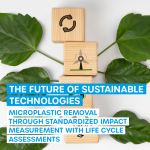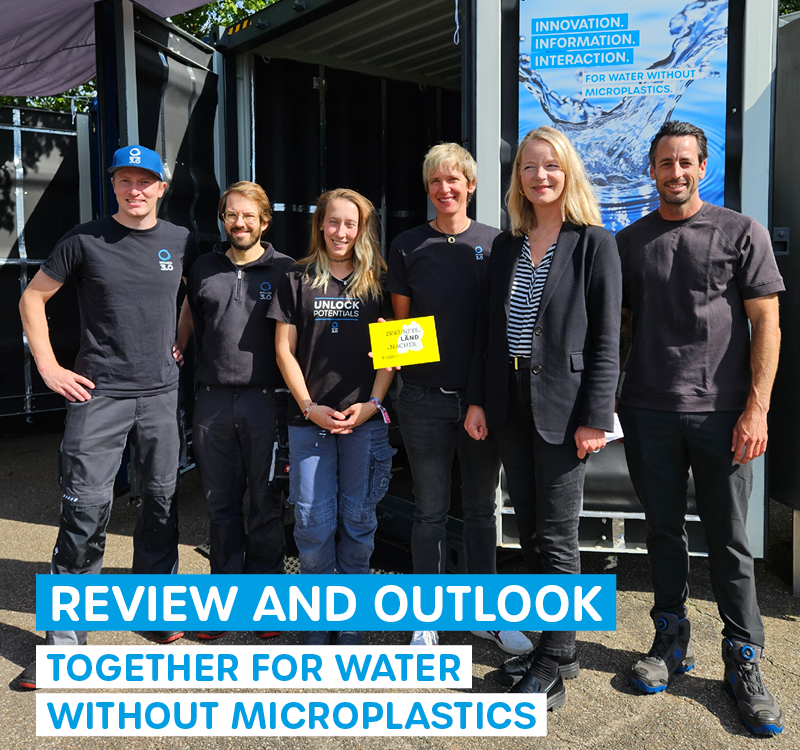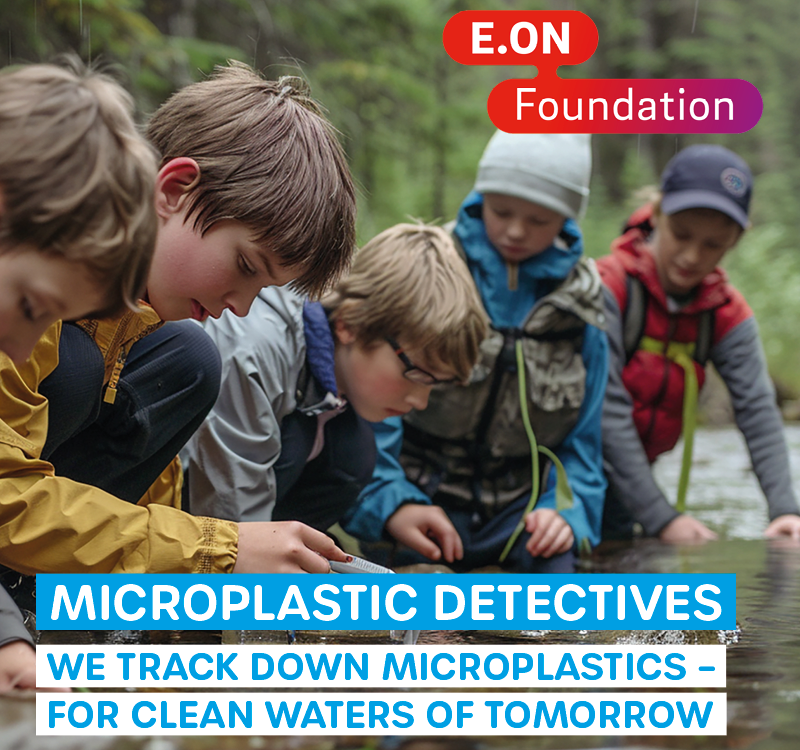
Microplastic Removal and LCA
19. August 2025
Standardized Sampling in Microplastic Analytics
25. August 2025Spread Love, Not Microplastics: When Heart-Based Education Meets Environmental Protection
A campaign that shows how education and love for the environment can go hand in hand – and why it urgently deserves long-term support.
Imagine you could combat water pollution and create genuine, loving connections between people with a single movement. That's exactly the vision behind "Spread Love, Not Microplastics" – our unique campaign that is far more than just a clever slogan.
A Campaign with Heart and Mind
“Spread Love, Not Microplastics” is more than a slogan – it's a movement that links emotional intelligence with environmental awareness. We make abstract environmental problems tangible and motivate concrete action.
What we've created here is revolutionary: A campaign that makes the often overwhelming topic of microplastic pollution emotionally accessible and encourages people to become part of the solution. It's not just about education, but about real action and measurable impact.
Why Long-term Funding of Educational Projects is Crucial
Germany is experiencing a remarkable development in the willingness to donate: In 2024, the average donation per person was 174 euros, representing an increase of 4 euros compared to 2023. The donor rate rose to 50.2% – meaning that more than half of the German population donated last year. Particularly encouraging is that donations from 30- to 39-year-olds increased by 27% in 2024 – the third consecutive year of growth. This indicates that younger generations are increasingly taking on social responsibility.
However, insights from the donation monitor make it clear: a willingness to donate and actual engagement go hand in hand. Those who donate want to be part of positive change. This is exactly where "Spread Love, Not Microplastics" comes in – the campaign makes donors active participants in a scientific mission.
The Global Map of Microplastics: Participatory Science as an Educational Revolution
A centerpiece of the campaign is the Global Map of Microplastics – an ambitious project that turns citizens into researchers. Every action results in a donation for our educational work. This makes each of you a valuable part of the Global Map of Microplastics and thus part of the solution.
This participatory science is exactly what our educational system needs: real, interdisciplinary projects that connect chemistry, biology, geography, ethics, and social sciences. Here people don't learn in isolated subject silos but gain an understanding of complex connections in our world.
A groundbreaking study by the University of Bayreuth shows: education on environmentally relevant topics like microplastics has great potential to promote environmentally friendly behavior. Research shows that participation in educational modules on marine waste led to improved environmentally friendly behaviors among students, which were also passed on to friends and family. Further research from Germany confirms: microplastic education programs lead to demonstrable knowledge gains among students – both short- and long-term.
We have already developed concrete educational projects that show how modern environmental education works: To achieve this, we combine the best of different worlds in our educational sector: real and virtual spaces, individual and collective learning, solid knowledge transfer and concrete action, open experimentation, and tangible connection to nature.
Experimental Education Beats Pure Theory – The Science is Clear
The research is clear: hands-on, practical learning is superior to traditional methods. A Harvard University studycompared the test results of eighth-graders who listened to lectures about water quality with students who built a water purification device. Students who learned through active learning achieved much higher test scores and improvement rates.
Even more impressive: when the results were counted, the authors found that although students felt they had learned more from the lectures, they actually achieved higher scores on tests after active learning sessions. This means that even when traditional instruction "feels" easier, students actually learn more through practical experiences.
Why is this so? A groundbreaking study by the University of Chicago shows: by combining different learning styles, the brain forms stronger overall connections and can store more relevant information. Brain scans also show increased activity in sensory and motor areas of the brain when thinking about concepts with which one has had practical experience. Research from Carnegie Mellon University confirms: students who physically experience scientific concepts understand them more deeply and perform better on tests.
We implement exactly these scientifically proven advantages: For the campaign's microplastic jersey, for example, various base materials were tested for microplastic abrasion, and the best washing parameters were developed to prevent microplastics from entering the environment. Durability was tested while cycling to sampling spots, and the wastewater was analyzed after various wash cycles. This is education with real impact.
The Education Paradox: Innovative Projects Without State Funding
We operate in the great paradox of our educational system: interdisciplinary educational projects, such as those on the topic of microplastics, receive no state funding in Germany unless they are conducted at universities.
The German research funding system supports traditional university research with around 30% of total R&D expenditure and education financing focusing heavily on established structures, while innovative, interdisciplinary approaches often go empty-handed.
As a very young company, our educational work is currently possible thanks to the support and funding of our sponsors and donors. We are thus dependent on private initiatives – just like hundreds of other innovative educational projects in Germany.
Why Non-Profit Organizations Shape the Education of the Future
Non-profit organizations like Wasser 3.0 have decisive advantages over sluggish educational institutions:
- Speed and relevance to reality: While state institutions need years for curriculum changes, NGOs work directly with the problems they research. New developments are integrated quickly and without much effort.
- Flexible and long-term educational formats: In our educational space, there are micro-learnings in the form of texts, videos, animations, and graphics. In the future, content will also be represented audio-visually. They can be combined with learning units designed for use in the classroom or seminar room. Educational research shows: practical learning supports deeper understanding by connecting theory with practice and building essential skills like problem-solving, collaboration, and critical thinking.
- Barrier-free access:
Flexible: location and time-independent, e.g. bridging unproductive times and waiting periods.
Suitable for everyday use: at home, on the go, at school, at work - available knowledge when needed.
Cost-effective: once created, usable by many.
Barrier-free: manageable units for low-threshold access.
The Power of Social Media for Educational Projects: Visibility Creates Impact
Social media is not just a nice extra for educational projects – it's a crucial lever for social change. Social media offers foundations the chance to make their mission visible, reach people, and inspire them for their causes. Platforms like Facebook, Instagram, LinkedIn, or TikTok open new ways for foundations to directly address their target groups, tell stories, and win supporters.
Particularly important: traditional press work often only reaches a limited audience. Social media, on the other hand, enables important topics to be made accessible to a broader audience – quickly, directly, and interactively.
The numbers speak for themselves: Over 83% of the German population aged 18 and over are using social media in 2024/2025. With 78% of the population falling within this age group – that means that 65.5 million people in Germany alone–continue to use social networks regularly. For educational projects, this represents enormous opportunities, as especially young people are best reached where they move digitally – particularly on platforms like TikTok or Instagram, where creative, entertaining content is in demand. Topics like environmental protection, social justice, or educational projects can be conveyed emotionally and authentically.
Current research shows: the success of educational interventions in social media depends on designing motivating learning environments that promote student engagement. Factors such as social participation (comments, likes), curiosity, and the quality of responses significantly influence interest and enjoyment of the platform.
Concrete Solutions Through Donations and Sponsoring
With your support, "Spread Love, Not Microplastics" can implement concrete educational measures that have a measurable social impact:
- Regional microplastic mapping: Promoting local citizen science projects where school classes, clubs, and families examine their waters and contribute to the global database. This creates local connection and global awareness. In the framework of the Global Map of Microplastics alone, over 500 water samples were collected this year, generating valuable scientific data. We were supported by more than 10,000 people, particularly active in the D-A-CH region.
- Water monitoring as educational experience: Development of mobile educational units that can be used in schools and communities. Students learn scientific methods directly at the stream, river or lake in front of their door.
- Interdisciplinary teaching materials: Creation of free, digital learning modules that connect microplastics with mathematics, chemistry, biology, geography, and ethics. Related to Goal 4 of the United Nations Sustainable Development Goals, this means ensuring inclusive, equitable, and quality education and lifelong learning opportunities for all people.
- Teacher training: Qualification of educators in experimental learning methods and environmental sciences, so they themselves become multipliers.
The Added Value for Sponsors: Authentic Impact Instead of Greenwashing
Why should companies become active specifically with "Spread Love, Not Microplastics"? The answer is obvious: this campaign delivers authentic, measurable impact instead of superficial greenwashing.
And these are the advantages:
Scientific credibility: Your support flows directly into real research and education. Every donated euro is transparently used for analyses, educational materials, and scientific work.
Emotional connection: The campaign creates a unique connection between human values (love, connection) and environmental protection. This is not a marketing phrase, but an authentic mission.
Long-term partnership: Investments in education and strengthening the educational sector are the key to a country's and its people's development. Those who invest here are building the future.
Measurable educational impact: Unlike many corporate social responsibility (CSR) projects, sponsors can track concrete educational successes here: How many school classes are reached? How many analyses are conducted? How many people are aware of the microplastics issue?
Community building: The campaign builds an engaged community of environmentalists, scientists, and education enthusiasts – a valuable target group for sustainability-oriented companies.
A Call to All Who Want to Rethink Education
Spread Love, Not Microplastics deserves our support because it shows that education can be emotionally touching while being scientifically founded. Many people want to do good and enjoy the feeling of helping with their donations and achieving sustainable impact.
We see it this way: the best partnerships are long-term partnerships. Because only this way can we really move something together. Sustainable educational work requires sustainable financing.
Become Part of the Movement!
Companies and individuals who support this movement are not just investing in a campaign. They are investing in a new generation of people who can understand and solve complex environmental problems. They enable education that appeals to both head and heart – equally.
Your support enables:
- Free educational materials for schools nationwide
- Scientific analyses of microplastics in German waters
- Teacher training in experimental learning methods
- A global database that informs politics and science
- Real change in the minds and hearts of an entire generation
The time is now for an educational revolution – and you can be part of it.
"Don't just invest in a campaign – invest in a movement that moves hearts and protects the planet."






